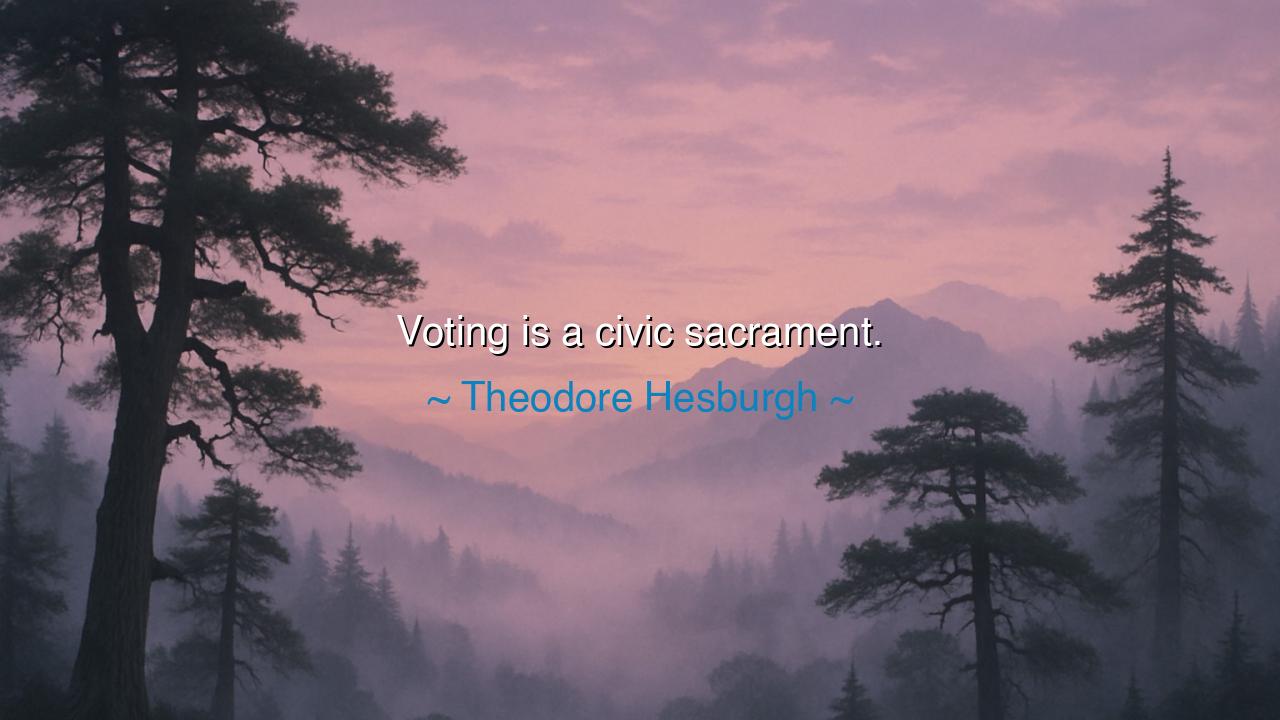
Voting is a civic sacrament.






The words of Theodore Hesburgh — “Voting is a civic sacrament.” — shine with the solemnity of ancient rites. In this brief sentence, Hesburgh, priest and educator, elevates the act of voting beyond mere politics, placing it among the sacred duties of humanity. Just as a sacrament in faith binds man to the divine, so too does voting bind citizen to country, conscience to community, and present to future.
The meaning is profound: in a democracy, voting is not a casual gesture, but a sacred trust. It is the moment when the individual soul joins with the multitude, shaping the destiny of the nation. To neglect it is not merely laziness; it is a kind of sacrilege, a refusal to honor the covenant of freedom purchased by the blood, sweat, and hope of those who came before. Hesburgh’s words remind us that voting is not only a right, but an act of reverence for the community of man.
History itself testifies to this truth. Consider the long struggle of the Civil Rights Movement, when African Americans marched, suffered, and even died for the chance to cast a ballot. The march from Selma to Montgomery in 1965 was no mere protest; it was a pilgrimage, and the ballot box was their altar. When at last the Voting Rights Act was passed, it was as though a sacred door had been opened, restoring to millions the sacrament long denied them.
The power of Hesburgh’s words also lies in their warning. For if voting is a sacrament, then to corrupt it with fraud, to suppress it with fear, or to cheapen it with indifference is to profane something holy. A nation that forgets this truth risks losing not only its freedom, but its very soul. The ballot is more than paper; it is the voice of the people consecrated into action.
Let these words be handed down as eternal wisdom: treat the act of voting not as a burden but as a blessing, not as duty alone but as devotion. Stand before the ballot box as one stands before an altar, mindful that through your choice, the future is written. For in this sacred act lies the true strength of a free people — the civic sacrament by which liberty is renewed, and the covenant of democracy is made everlasting.






MTNguyen Minh Thu
The idea of voting as a ‘civic sacrament’ makes me reflect on how people perceive their role in a democracy. If voting is a sacred duty, then how do we ensure that everyone is equally empowered to fulfill it? Are we creating systems that make voting accessible and meaningful for all citizens? Shouldn’t we treat the process with more respect and ensure that it’s a sacred right for every eligible person?
QT44-Nguyen Quang Truong-12A1
Hesburgh’s quote seems to elevate voting beyond a simple political act into something almost holy. Does this mean that voting should be treated with more seriousness, especially considering how many people still face barriers to casting their vote? Could the concept of ‘sacredness’ in voting lead to stronger protections for voting rights, and maybe even make people more proactive in ensuring they participate in every election?
TNHong thuan Nguyen
Viewing voting as a ‘civic sacrament’ suggests that it's more than just a right—it’s a moral obligation. But how can we encourage more people to see it this way, especially in societies where voter turnout is low? If voting is so important, should there be more education or initiatives to help people understand the weight of their vote? How do we make sure that people value the act of voting for what it truly represents?
TKnguyen trong khoi
I find Hesburgh’s idea compelling, but it also raises questions about what happens when people feel disconnected from the political process. If voting is indeed a sacred act, why is it that so many people choose not to participate, or feel that their vote doesn’t matter? Could it be that the political system itself has lost its perceived sanctity, and people are no longer invested in making that civic sacrifice?
VTPhung Van Thanh
Theodore Hesburgh’s perspective on voting as a ‘civic sacrament’ makes me think about the sacred responsibility that comes with the right to vote. If we view voting as a form of civic duty on par with a sacrament, does that imply that people should approach it with more reverence and care? Shouldn’t we treat elections as a sacred opportunity to shape our society, rather than something to be taken lightly or ignored?